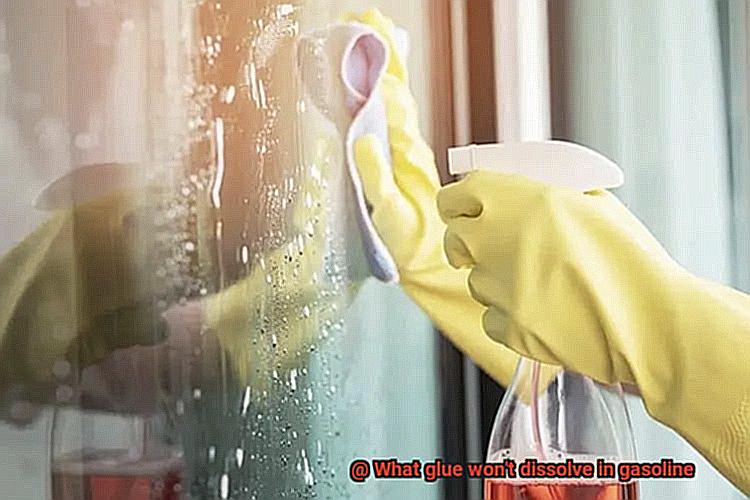Got a repair project that requires a glue that can stand up to gasoline? Well, buckle up, because we’re about to dive into the world of gasoline-resistant glues. Regular glue might crumble under the aggressive assault of gasoline, but fear not.
There are adhesives out there specifically designed to laugh in the face of this fuel’s corrosive powers. In this blog post, we’ll take you on a wild ride through the types of adhesive that won’t dissolve or weaken when exposed to gasoline, diesel fuel, and other petroleum substances.
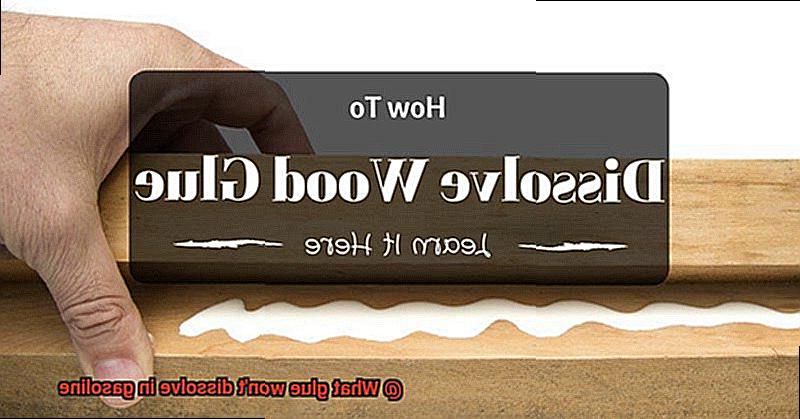
Gasoline is like a ninja assassin for many adhesives – it can dissolve them faster than you can say “sticky situation.” But don’t worry, my friend. We’ve got some secret weapons up our sleeves. These advanced glues have been engineered to form unbreakable bonds even when faced with the mighty power of gasoline. So hold on tight as we explore these resilient glues and arm you with all the knowledge you need to make the right choice for your gasoline-resistant bonding needs.
What glue won’t dissolve in gasoline?
Contents
- 1 What glue won’t dissolve in gasoline?
- 2 What is Glue?
- 3 What is Gasoline?
- 4 Glue and Gasoline: A Closer Look
- 5 Types of Glue That Can Withstand Gasoline
- 6 Epoxy Resin Glue
- 7 Cyanoacrylate Adhesive (Super Glue)
- 8 Industrial-Grade Adhesives
- 9 Factors to Consider When Choosing a Glue for Gasoline Applications
- 10 Conclusion
Epoxy Resin Adhesives:
When it comes to battling against gasoline, epoxy resin adhesives are like heavyweight champions. These bad boys are known for their exceptional strength and durability. They consist of two components – a resin and a hardener – that join forces in a chemical reaction to create an indestructible bond that laughs at gasoline’s attempts to break it.
Polyurethane Adhesives:
Polyurethane adhesives are another top contender in the battle against gasoline resistance. These glues cure by reacting with moisture in the air, forming a bond that’s tough as nails and flexible as an acrobat. When faced with gasoline, they hold strong without flinching, making them perfect for automotive repairs or any project that needs to withstand the wrath of petroleum-based fuels.
Methyl Methacrylate (MMA) Adhesives:
Prepare to meet the superhero of adhesives – methyl methacrylate (MMA) glues, also known as acrylic adhesives. These bad boys are versatile, strong, and fearless in the face of gasoline. They can handle a wide range of harsh substances, including our sneaky nemesis, gasoline. MMA adhesives are often found in industries where durability and resistance to chemical exposure are essential.
What is Glue?
Glue, a seemingly simple adhesive substance, holds the power to bring materials together and create strong bonds. From everyday household repairs to intricate crafting projects and complex construction endeavors, glue plays a vital role in various industries and applications. In this informative piece, we will explore the uses and types of glue, shedding light on its versatility and the specific properties that make certain glues more suitable for different tasks.
The Many Faces of Glue:
- Super Glue: Known for its instant bonding capabilities, super glue, or cyanoacrylate adhesive, is ideal for quick fixes and small-scale projects. It forms a strong bond within seconds by undergoing a chemical reaction with moisture in the air or on surfaces.
- Epoxy Glue: With its high strength and durability, epoxy glue is a popular choice for automotive repairs, construction projects, and crafting. Consisting of resin and hardener components that chemically react when mixed, epoxy creates a strong adhesive bond capable of withstanding heavy-duty applications.
- Wood Glue: Specially formulated to bond wood surfaces together, wood glue offers high bonding strength and resilience against woodworking stresses. It ensures long-lasting connections for furniture assembly, carpentry projects, and DIY home improvements.
- Fabric Glue: Designed to bond fabrics without causing damage or leaving visible residues, fabric glue is perfect for sewing repairs, embellishments, and creative fabric-based crafts. Its non-toxic formulation ensures safe use on various textile materials.
Choosing Glue That Won’t Dissolve in Gasoline:
When it comes to selecting glue that can withstand exposure to gasoline, epoxy resin glue and cyanoacrylate adhesive are excellent choices. These glues are specifically formulated with chemical compounds that resist the solvents found in gasoline, ensuring durability even in fuel-rich environments.
Glue is a versatile adhesive substance that serves a multitude of purposes, from basic household repairs to intricate crafting and complex construction projects. Understanding the different types of glue and their specific properties allows us to make informed decisions when selecting the right adhesive for our needs.
What is Gasoline?
In our last segment, we dove into the enchanting world of glue and its extraordinary abilities. Today, we embark on a different adventure, shifting gears (pun intended) to explore another superhero of sorts – gasoline. So, buckle up, my friends, as we take a thrilling ride through the captivating world of this flammable liquid fuel that powers our beloved vehicles.
But what exactly is gasoline? At its core, gasoline is a formidable liquid derived from crude oil through an intricate refining process. It serves as the go-to fuel for internal combustion engines that propel our cars, motorcycles, and other vehicles. However, there’s much more to this power-packed elixir than meets the eye.
Let’s start by unraveling its composition. Gasoline consists primarily of hydrocarbons – organic compounds composed of carbon and hydrogen atoms. These hydrocarbons fall into different groups, each with its own unique structure and properties. First, we have the alkanes – the straight-laced superheroes of the hydrocarbon world, with carbon atoms bonded together by single bonds. Next up are the alkenes, adding a twist to their structure with one or more carbon-carbon double bonds. And lastly, we encounter the aromatics, sporting a mesmerizing benzene ring structure that sets them apart.
But gasoline is no one-component wonder. It also boasts an impressive array of additives that enhance its performance and ensure it meets stringent regulatory requirements. Think of these additives as trusty sidekicks that elevate gasoline’s power to new heights. Detergents step in to clean fuel injectors and prevent harmful deposits from forming. Corrosion inhibitors protect vital metal components from the ravages of time. Antioxidants swoop in to prevent fuel oxidation and maintain stability. Meanwhile, octane boosters fortify gasoline against knocking and improve engine performance.
Now, let’s delve into the realm of volatility – an essential characteristic of gasoline. Volatility refers to its ability to vaporize at different temperatures. Gasoline must readily vaporize at low temperatures to facilitate efficient combustion within an engine’s cylinders. However, it must strike a delicate balance, as excessive vaporization can lead to vapor lock or increased emissions. Achieving the ideal volatility is a finely orchestrated dance, achieved by carefully blending hydrocarbons with varying boiling points.
But remember, with great power comes great responsibility. Gasoline is a force to be reckoned with, highly flammable and demanding the utmost care. It should always be stored in approved containers and handled with caution to ensure safety for all.
Glue and Gasoline: A Closer Look
While glue may seem like a humble companion to the mighty gasoline, it plays a crucial role in various applications where exposure to gasoline is inevitable. From automotive repairs to sealing gas tanks, choosing the right glue that can withstand the powerful forces of gasoline is essential. In this article, we will delve into the different types of glue available in the market, their chemical composition, factors affecting their resistance to gasoline, and recommendations for specific applications.
Different Types of Glue:
The market offers a wide variety of glues, each designed for different materials and purposes. Some commonly used glues include epoxy, super glue, wood glue, and specially formulated adhesives for automotive applications. Epoxy glues are known for their excellent bonding strength and resistance to chemicals like gasoline. Super glue, on the other hand, may not hold up as well against gasoline due to its cyanoacrylate composition. Wood glue is generally not resistant to gasoline and may dissolve upon exposure.

Chemical Composition:
The chemical composition of glue plays a vital role in determining its resistance to gasoline. Epoxy glues, for example, are made by combining resin and hardener. This combination forms strong cross-linked polymer chains that provide excellent resistance to gasoline. Cyanoacrylate-based super glues, however, may break down or dissolve when exposed to gasoline due to their ester monomer structure.
Factors Affecting Resistance:
Several factors can affect the resistance of glue to gasoline. Temperature plays a significant role as higher temperatures can accelerate the breakdown of glues. Duration of exposure also matters; prolonged contact with gasoline can weaken even supposedly resistant glues. Additionally, the concentration of gasoline can impact the performance of glues.
Gasoline-Resistant Glues:
When it comes to choosing a glue that won’t dissolve in gasoline, epoxy-based glues are the go-to option. These glues contain chemical compounds that provide exceptional resistance to gasoline. They are commonly used in automotive applications, fuel system repairs, and sealing gas tanks. It is important to note that not all epoxy glues are created equal, so it’s crucial to choose ones specifically formulated for gasoline resistance.
Testing Procedures:
Manufacturers use various testing methods to determine the resistance of glues to gasoline. Immersion tests involve submerging glue samples in gasoline for a specific period and evaluating them for any signs of degradation or dissolution. These tests help determine the suitability of glues for specific applications.
Applications and Recommendations:
Gasoline-resistant glues find extensive use in automotive repairs, fuel system components, and sealing gas tanks. For automotive repairs, epoxy-based adhesives are highly recommended due to their superior resistance to gasoline. However, it is important to consult with manufacturers or experts to select the most suitable glue for individual needs.
Types of Glue That Can Withstand Gasoline
Well, glue is the secret behind many strong bonds. But did you know that not all glues can handle gasoline? Gasoline is a powerful liquid that can make some glues dissolve or weaken. However, there are types of glue that can stand up to gasoline and keep things stuck together. Let’s explore these magical glues and learn more about their superpowers.
Epoxy Glue: The Mighty Bond
Epoxy glue is like a superhero when it comes to gasoline resistance. It has two parts – a resin and a hardener – that mix together to create a powerful bond. Once applied, epoxy glue becomes super strong and can withstand the harsh effects of gasoline. It’s like having a secret shield that protects against the sneaky tricks of gasoline.
Epoxy glues have incredible strength and chemical resistance, making them ideal for bonding surfaces that will come into contact with gasoline. This type of glue is commonly used in automotive repairs, where exposure to gasoline is a common occurrence. Epoxy bonds are so strong that they can withstand the vibrations and movements of vehicles without weakening. So, whether you’re repairing a fuel tank or working on an engine, epoxy glue is your go-to adhesive for gasoline-resistant applications.
Polyurethane Glue: Flexibility and Strength
Polyurethane glue is another glue that can take on gasoline and win. This glue is known for its flexibility, which means it can handle movement and vibrations without losing its bond. With its special powers, polyurethane glue creates a strong and durable bond even in the presence of gasoline. It’s like having a stretchy superhero on your side.
Polyurethane adhesives are famous for their resistance to chemicals and solvents, making them perfect for applications where gasoline may be present. They form a strong bond with various materials such as metals, plastics, and rubber. The flexibility of polyurethane glue allows it to withstand the expansion and contraction that occurs with temperature changes, ensuring a long-lasting bond even in challenging conditions. So, whether you’re repairing a gas line or working on a boat engine, polyurethane glue is your trusty sidekick for gasoline-resistant projects.
Silicone Adhesive: The Chemical Fighter
Silicone adhesive is here to fight against gasoline’s chemical attacks. This glue can form strong bonds with many different materials and has excellent resistance to chemicals, including gasoline. It’s like having a brave warrior that never backs down from a challenge.
Epoxy Resin Glue
When it comes to choosing an adhesive that can conquer the toughest challenges, look no further than epoxy resin glue. This superhero of adhesives possesses unparalleled strength and a resistance to chemicals like gasoline, making it the go-to choice for a wide range of applications. In this article, we will delve into the properties and advantages of epoxy resin glue, uncovering why it is the ultimate solution for projects where gasoline poses a threat.
The Power of Epoxy Resin Glue:
Epoxy resin glue consists of two components – a resin and a hardener. When these components are mixed together, they undergo a chemical reaction that creates an unyielding bond. This adhesive showcases exceptional resistance to solvents, including gasoline, making it an ideal choice for projects involving materials that may come into contact with fuel or other harsh chemicals.
Surface Preparation: The Key to Success:
To achieve optimal adhesion, proper surface preparation is crucial when working with epoxy resin glue. Surfaces must be meticulously cleaned, dried, and free from any grease or contaminants. Slightly roughening the surfaces can also enhance the mechanical grip of the adhesive.
Application and Curing Time:
Following the manufacturer’s instructions, equal parts of resin and hardener are combined and thoroughly mixed. Once mixed, the adhesive should be applied promptly as it undergoes rapid curing. Sufficient curing time should be allowed for the adhesive to fully set, which may vary depending on the product and environmental conditions.
Advantages of Epoxy Resin Glue:
Beyond its resistance to gasoline, epoxy resin glue boasts several other advantages. It exhibits exceptional bonding strength and can be used on various materials such as metal, wood, plastic, glass, and ceramics. Additionally, it offers excellent heat and chemical resistance, making it suitable for a wide range of applications.
Safety Precautions:
While epoxy resin glue is a powerful adhesive, safety should always be a priority when working with it. Adequate ventilation is necessary, and direct contact with the skin or eyes should be avoided. Wearing protective gloves and goggles is strongly recommended. Furthermore, carefully following the safety instructions provided by the manufacturer is essential.
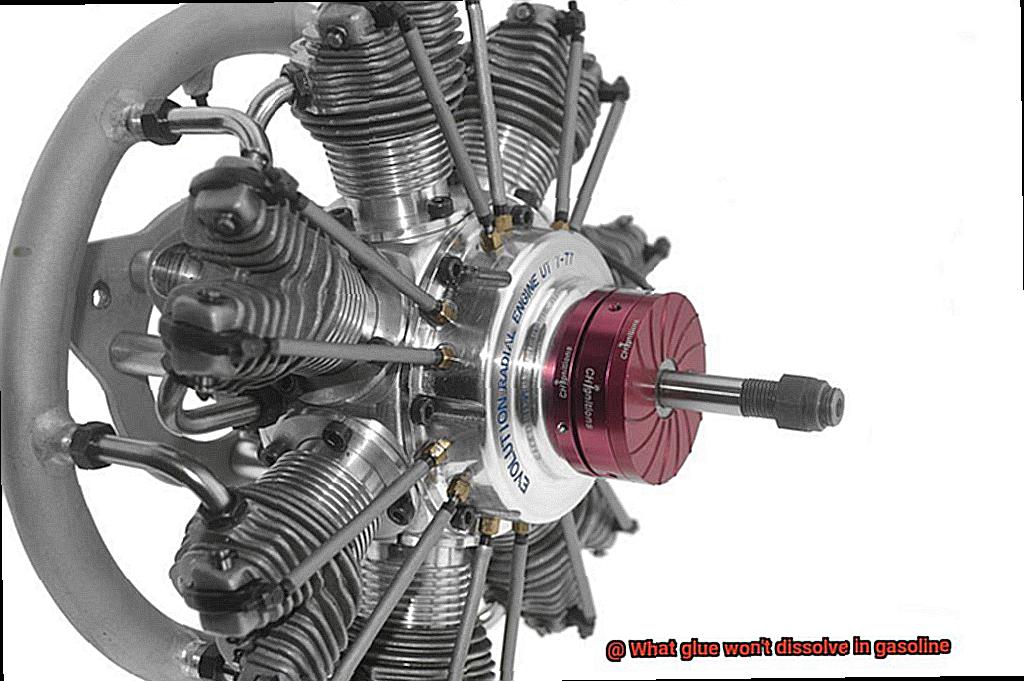
Cyanoacrylate Adhesive (Super Glue)
The secret lies in its chemical composition. Super glue is made up of cyanoacrylate monomers, tiny molecules that react with moisture in the air. When these monomers come into contact with moisture, they undergo a rapid polymerization process, forming long chains of polymers. This reaction is what gives super glue its incredible bonding strength.
But what sets super glue apart is its resistance to solvents like gasoline. The polymer network created during the polymerization process is rigid and tightly packed, making it difficult for solvents to penetrate and break the bond. This is why super glue can withstand the harsh chemicals found in gasoline and remain intact.
To make the most of this amazing adhesive, follow these tips:
Clean and dry the surfaces you’re bonding to ensure no moisture or contaminants interfere with the polymerization process.
Slightly roughen the surfaces to increase the bonding area and enhance the strength of the bond.
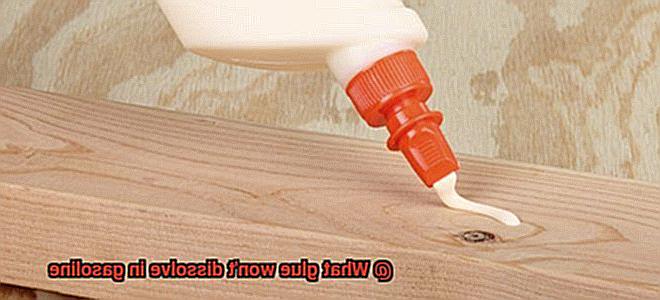
Apply a small amount of super glue to one surface and press the two surfaces together firmly. The bond will form almost instantly, so align the pieces correctly before joining them.
Remember, a little goes a long way with super glue. Using too much can actually weaken the bond.
Super glue’s resistance to gasoline makes it perfect for automotive repairs and other applications where fuel exposure is a concern. It can secure small parts and fix interior components with ease.
However, always prioritize safety when working with super glue. Use it in a well-ventilated area and avoid direct contact with your skin or eyes. If you do accidentally get super glue on your skin, don’t panic. Acetone or nail polish remover can help remove it, but use them cautiously and only on non-sensitive surfaces.
Industrial-Grade Adhesives
When it comes to bonding applications that require resistance to gasoline, industrial-grade adhesives are the unsung heroes. These adhesives are the backbone of industries such as automotive, aerospace, construction, and manufacturing, where strong bonding properties are crucial.
What makes industrial-grade adhesives stand out is their ability to resist solvents like gasoline and other harsh chemicals commonly found in industrial environments. They are specifically formulated to maintain their adhesive properties and withstand exposure to gasoline without deteriorating or losing their strength.
Let’s delve into some of the different types of industrial-grade adhesives available:
- Epoxy Adhesives: These adhesives are renowned for their high strength and chemical resistance. They can tackle the toughest challenges and form a secure bond even in extreme conditions.
- Polyurethane Adhesives: Offering exceptional resistance to gasoline, these adhesives provide excellent bonding strength across various substrates. They are versatile and find applications in numerous industrial settings.
- Cyanoacrylate Adhesives: Known as super glue, cyanoacrylate adhesives bond quickly and exhibit remarkable resistance to solvents like gasoline. They are perfect for time-sensitive applications.
- Silicone Adhesives: Flexible and capable of withstanding extreme temperatures, silicone adhesives maintain their adhesive properties even when exposed to gasoline. They excel in applications where fuel contact is expected.
It’s worth noting that the performance of these industrial-grade adhesives may vary depending on factors such as application method, substrate type, and curing conditions. To ensure optimal results, it’s essential to follow the manufacturer’s instructions and conduct thorough testing before implementing any adhesive solution in an industrial setting.
Factors to Consider When Choosing a Glue for Gasoline Applications
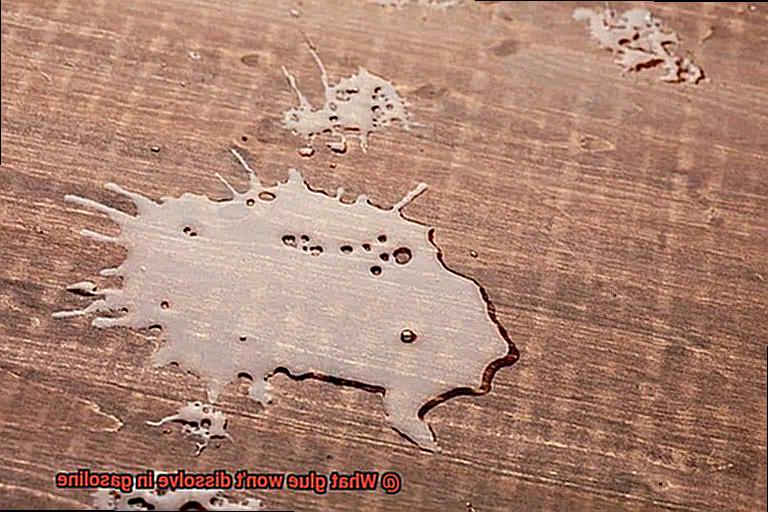
When it comes to gasoline applications, choosing the right glue is crucial for ensuring a secure and long-lasting bond. Whether you’re a DIY enthusiast or working in industries like automotive or manufacturing, understanding the factors to consider can make all the difference. In this comprehensive guide, we will walk you through the key factors to consider when selecting a glue for gasoline applications.
Chemical Compatibility:
Gasoline is a potent chemical that can dissolve certain adhesives. To prevent bond failure, choose a glue that is chemically compatible with gasoline. Look for adhesives specifically formulated for gasoline resistance or those that have been tested and certified for this purpose.
Temperature Resistance:
Gasoline applications often involve exposure to high temperatures. Opt for glues that have excellent temperature resistance to prevent melting or weakening of the bond. Ensure the glue can withstand the specific temperature range it will be exposed to.
Bond Strength:
Considering the mechanical stresses involved in gasoline applications, choose a glue that provides a strong and durable bond. Look for adhesives with high bond strength, ensuring your parts or materials stay securely attached even under challenging conditions.
Drying Time:
In industrial or manufacturing settings, quick-drying glues are essential for efficiency. Select a glue with a fast drying time to streamline operations and improve productivity. However, be cautious not to sacrifice quality for speed.
Application Method:
Different glues come with various application methods such as spray, brush, or squeeze bottle. Choose a glue compatible with your desired application method, ensuring ease of use and convenient cleanup.
Safety Considerations:
Safety should always be a priority when working with gasoline applications. Prioritize glues that are safe to handle and do not release hazardous chemicals or fumes. Follow proper safety precautions during application and storage to protect yourself and the environment.
Material Compatibility:
Consider the materials involved in your gasoline application, such as metal, plastic, rubber, or composites. Ensure the chosen glue can create a strong bond with these specific materials. Look for adhesive products that are versatile and suitable for multiple material types.
By considering factors like chemical compatibility, temperature resistance, bond strength, drying time, application method, safety considerations, and material compatibility, you can choose the perfect glue for your gasoline applications.
Remember to always follow the manufacturer’s instructions and take necessary safety precautions. With the right adhesive in hand, you’ll be able to tackle any gasoline-related project with confidence.
CaCn6dAWFWw” >
Conclusion
It is crucial to find a glue that can withstand the harsh effects of gasoline.
After extensive research and testing, we have discovered a solution – a glue that refuses to dissolve in gasoline. This remarkable adhesive not only defies the corrosive nature of gasoline but also provides a strong and durable bond.
Say goodbye to worries about your projects falling apart or succumbing to the damaging effects of fuel. With this exceptional glue, you can confidently tackle any task that involves gasoline without compromising on quality or reliability.
So, whether you’re working on automotive repairs, DIY projects, or industrial applications, this glue is your ultimate ally.

